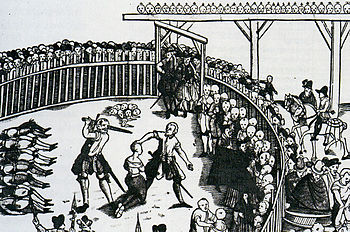- Executioner
-
A judicial executioner is a person who carries out a death sentence ordered by the state or other legal authority, which was known in feudal terminology as high justice.
Contents
Scope and job
The executioner was usually presented with a warrant authorizing or ordering him to execute the sentence. The warrant protects the executioner from the charge of murder. Common terms for executioners derived from forms of capital punishment—though they often also performed other physical punishments—include hangman (hanging) and headsman (beheading). In the military the role of executioner was usually performed by a soldier, such as the provost. A common stereotype of an executioner is a hooded medieval or absolutist executioner.
While this task can be an occasional one, it can be carried out in the line of more general duty by an officer of the court, the police, prison staff, or even the military. A special case is the tradition of the Roman fustuarium, continued in forms of running the gauntlet, where the culprit receives his punishment from the hands of the comrades his crime has gravely harmed, e.g. for failing in vital sentinel duty or stealing from a ship's limited food supply.
Many executioners were professional specialists, who usually travelled a whole area since executions would rarely be very numerous. Still, especially if a resident, he would often also administer non-lethal physical punishments, or apply torture.
The term is also extended to administrators of a severe physical punishment that is not prescribed to kill, but which may result in death.
Since executions in France (using the guillotine since the French Revolution) persisted until 1977, the French Republic had an official executioner, Marcel Chevalier, until the formal abolition in 1981.
Executioners in society
In Europe and its colonies, executioners have often been shunned by their neighbours. This attitude can be observed in numerous novels and films, for instance in Alexandre Dumas, père's The Three Musketeers or in the film La veuve de Saint-Pierre (The Widow of Saint-Peter) in which executioners, who are minor characters, were ostracized by villagers. The profession of executioner sometimes ran through a family, especially in France where the Sanson family provided six executioners between 1688 and 1847, and the Deibler dynasty provided five between 1879 and abolition in 1981 (Louis Deibler, his son Anatole, Anatole's nephew Jules-Henri Desfourneaux, another nephew of Anatole, André Obrecht, and finally André's stepson, Marcel Chevalier). In Britain, the most notable dynasty was the Pierrepoints, who provided three executioners between 1902 and 1956 - Henry, his brother Thomas, and Henry's son Albert.
Native societies in Asia, Africa, the Americas, and the Pacific seem to rarely display such blame towards executioners, even when, as in North America, there is significant and vocal opposition to the death penalty itself.[citation needed]
An exception is in Japan where executioners are being held in contempt as part of the Burakumin class (today executions in Japan are not carried out by professional executioners, but by prison guards regularly moved). In "Memories of Silk and Straw", by Junichi Saga, one of the families surveyed in the Japanese village of Tsuchiura is that of an executioner family ("The Last Executioner", P. 54). This family does suffer social isolation, even though the family is somewhat well-off financially.
In the Ottoman Empire, only gypsies could be executioners. Executioners were seen as "damned" people and even their graveyards were separate from public graveyards. There were no inscriptions on executioner tombstones, usually uncarved and unpolished simple rough stones were used. One of the oldest and largest "executioner graveyards" is in the Eyüp district in Istanbul. After the republican revolution in Turkey, executions continued to be performed by gypsy executioners. This situation continued until the dissolution of capital punishment in Turkey.
The lack of social shunning for executioners in places like North America may be attributed to the infrequency of executions in modern times and the ease in which prison or judicial official are able to conceal their daily job duties. This provides anonymity that was not possible when executions were carried out in view of the general public.
See also
- List of executioners
- Scharfrichter
- Pierrepoint (film)
- Executioner's sword
- Sword of Justice
- The Executioner (Kisyov novel)
References
Categories:- Executioners
- Capital punishment
- Legal professions
- Penology
Wikimedia Foundation. 2010.

